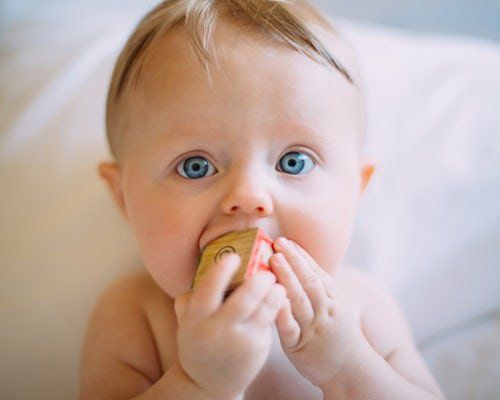Pediatric Dentistry: Teething Symptoms and Remedies
It's no surprise that teething is a tough time for your baby. After all, new bones are growing and forcing their way through her gums. Teething is often a difficult time for parents as well. Your fussy baby likely demands all of your attention during the day and is sleeping less at night. Besides, no parent wants to see their child in pain. The best way to help your little one is to learn the basics of teething and simple ways to help.

When Does Teething Start?
Teething often begins between the ages of 4 to 8 months of age, with 6 monthsbeing the most commonly reported time for the eruption of the first tooth. The two bottom front teeth usually erupt first, followed by the top front teeth. Some teeth may cause more symptoms than others. Most children have all of their baby teeth by the age of 3.
The eruption of your baby's first teeth is when you should schedule your baby's first dental appointment. Getting your baby's first toothbrushearly will set up a lifetime of good dental health.
Teething Symptoms
Like most growing pains, teething symptomscan vary. However, there are some common symptoms that babies usually experience during the process. Some symptoms are similar to illnesses, so it is important to watch for symptoms that signal your baby is sick.
Common Teething Symptoms
- Irritability
- Trouble sleeping
- Clinginess
- Drooling
- A runny nose
- Cough
- Loss of Appetite
Symptoms to Discuss With Your Pediatrician
- Rash
- Diarrhea
- Fever
Teething Remedies
There is no "fix" to cure your baby's teething symptoms. Similar to what your pediatrician tells you about a cold, you can only treat the symptoms. Treating your baby's symptoms simply means finding ways to make him more comfortable. When the growing tooth erupts through the gums, symptoms usually decrease quickly. These remediescan be helpful when symptoms are at their worst.
- Rub your baby's gums with a finger or gauze pad.
- Give him a cool rubber teething ring or washcloth to bite.
- Wipe away drool to avoid chapped lips and chin.
- Provide extra attention to comfort your baby.
- If she remains inconsolable, try an age-appropriate over-the-counter pain reliever.
Teething gels with benzocaineare not recommended for children under two years old because of the risk of a rare but serious reaction. Certain homeopathic teething tabletsare also discouraged by the Food and Drug Administration (FDA).
At the office of Dr. Ronald A. Murphy, we provide a gentle, caring experience for your baby's first dental visit. If your baby's first teeth have come in and you want to learn more about pediatric dental care, contact ustoday for a consultation.
